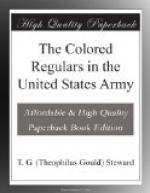If the times of 1830 were eventful, there were among our people, as well as among other peoples, men equal to the occasion. We had giants in those days! There were Bishop Allen, the founder of the great Bethel connection of Methodists, combining in his person the fiery zeal of St. Francis Xavier with the skill and power of organizing of a Richelieu; the meek but equally efficient Rush (who yet remains with us in fulfilment of the Scripture), the father of the Zion Methodists; Paul, whose splendid presence and stately eloquence in the pulpit, and whose grand baptisms in the waters of Boston harbor are a living tradition in all New England; the saintly and sainted Peter Williams, whose views of the best means of our elevation are in triumphant activity to-day; William Hamilton, the thinker and actor, whose sparse specimens of eloquence we will one day place in gilded frames as rare and beautiful specimens of Etruscan art—William Hamilton, who, four years afterwards, during the New York riots, when met in the street, loaded down with iron missiles, and asked where he was going, replied, “To die on my threshold”; Watkins, of Baltimore; Frederick Hinton, with his polished eloquence; James Forten, the merchant prince; William Whipper, just essaying his youthful powers; Lewis Woodson and John Peck, of Pittsburg; Austin Steward, then of Rochester; Samuel E. Cornish, who had the distinguished honor of reasoning Gerrit Smith out of colonization, and of telling Henry Clay that he would never be president of anything higher than the American Colonization Society; Philip A. Bell, the born sabreur, who never feared the face of clay, and a hundred others, were the worthily leading spirits among the colored people.
And yet the idea of the first colored convention did not originate with any of these distinguished men; it came from a young man of Baltimore; then, and still, unknown to fame. Born in that city in 1801, he was in 1817 apprenticed to a man some two hundred miles off in the Southeast. Arriving at his field of labor, he worked hard nearly a week and received poor fare in return. One day, while at work near the house, the mistress came out and gave him a furious scolding, so furious, indeed, that her husband mildly interfered; she drove the latter away, and threatened to take the Baltimore out of the lad with cowhide, etc., etc. At this moment, to use his own expression, the lad became converted, that is, he determined to be his own master as long as he lived. Early nightfall found him on his way to Baltimore which he reached after a severe journey which tested his energy and ingenuity to the utmost. At the age of twenty-three he was engaged in the summer time in supplying Baltimore with ice from his cart, and in winter in cutting up pork for Ellicotts’ establishment. He must have been strong and swift with knife and cleaver, for in one day he cut up and dressed some four hundred and fifteen porkers.




